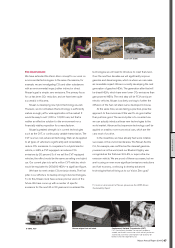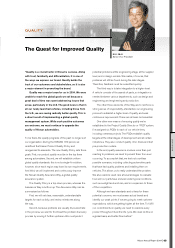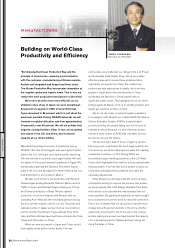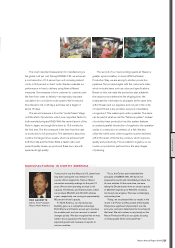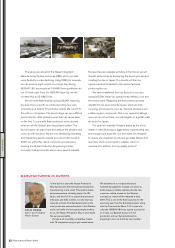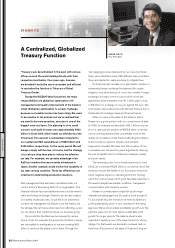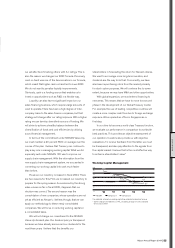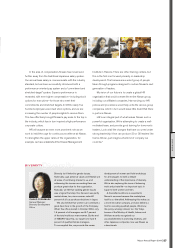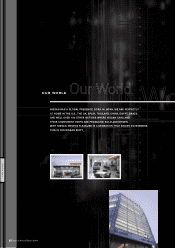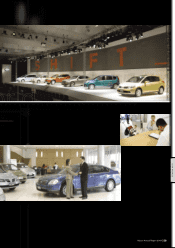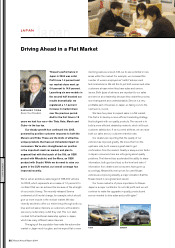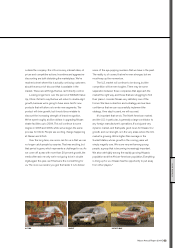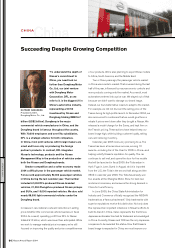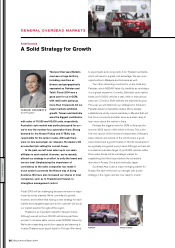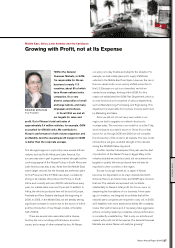Nissan 2005 Annual Report Download - page 59
Download and view the complete annual report
Please find page 59 of the 2005 Nissan annual report below. You can navigate through the pages in the report by either clicking on the pages listed below, or by using the keyword search tool below to find specific information within the annual report.
Nissan Annual Report 2004 57
Institute in Hakone. There are other training centers, but
this is the first one focused primarily on leadership
development. The trainees are a select group of people
taken through programs designed to nurture Nissan’s next
generation of leaders.
My vision of our future is to create a global HR
organization that would oversee the entire Nissan group,
including our affiliated companies. Harmonizing our HR
polices and procedures would help unite the various group
companies, which in turn would leave little doubt that there
is just one Nissan.
HR is an integral part of what makes Nissan such a
powerful organization. We’re attempting to create a well-
motivated team, and provide good training for tomorrow’s
leaders. Look at all the changes that have occurred under
strong leadership! If we can produce 20 or 30 leaders like
Carlos Ghosn, just imagine what kind of company we
could be.”
In the area of compensation, Nissan has moved even
further away from the traditional Japanese salary system.
Our annual base salary is commensurate with the industry
standard, but we have successfully introduced both a
performance-oriented pay system and a “commitment and
stretched-target” system. Superior performance is
rewarded, with even higher compensation—including stock
options for executives—for those who meet their
commitments and stretched targets. In 2004, nearly five
hundred employees exercised stock options, and we are
increasing the number of people eligible to receive them.
This has effectively brought Nissan’s pay scale to the top in
the industry, which has in turn inspired a high-performance
corporate culture.
HR will assume an even more prominent role as we
work to instill the urge for continuous excellence at Nissan.
To strengthen the upper ranks of the organization, for
example, we have established the Nissan Management
Diversity isn’t limited to gender issues.
Nationality, age, personal values and lifestyle are
all areas of continuing interest to us, and
addressing the issues surrounding them can
produce great value for the organization.
Naturally, we felt that tackling gender issues
was a logical first step. Our decision was partly
market-driven, too, since women make 60
percent of all car purchase decisions in Japan.
We also believe that women can contribute a
great deal more to the growth of the Company.
When this office started in October 2004, only
1.6 percent of all managers and 5.7 percent
of the total workforce were women. By the end
of NISSAN Value-Up, our target is to have 5
percent of qualified female managers.
To accomplish this, we promote the career
development of women and hold workshops
for all managers to instill a deeper
understanding of the importance of diversity.
We’re also exploring the issue of balancing
work and private life—an important topic in
Japan to both women and men.
A diversified workforce is essential to
Nissan’s success because the marketplace
itself is so diversified. Addressing this makes us
a more innovative company, and also delivers a
tool for recruiting qualified people. We know
this policy is being noticed, too: the Tokyo
bureau of the Ministry of Health, Labour and
Welfare recently recognized our
accomplishments in promoting diversity, and
other Japanese companies now use Nissan as
a benchmark.
YUKIKO YOSHIMARU
General Manager
Diversity Development
Office
DDiivveerrssiittyy
DIVERSITY
OUR WORK


